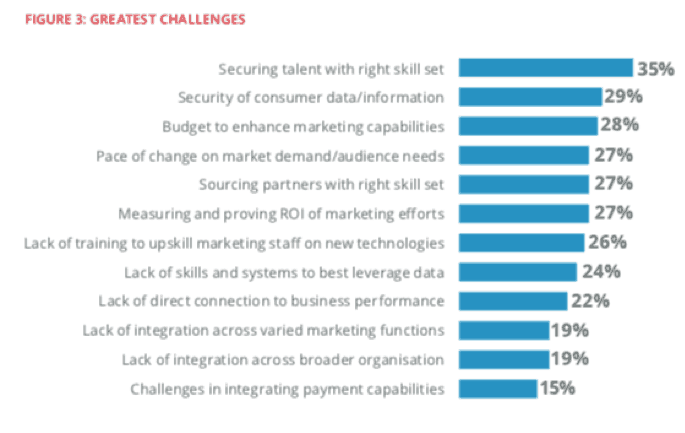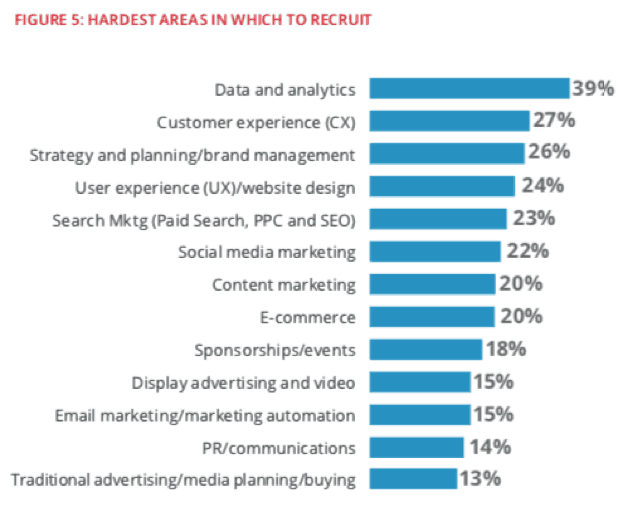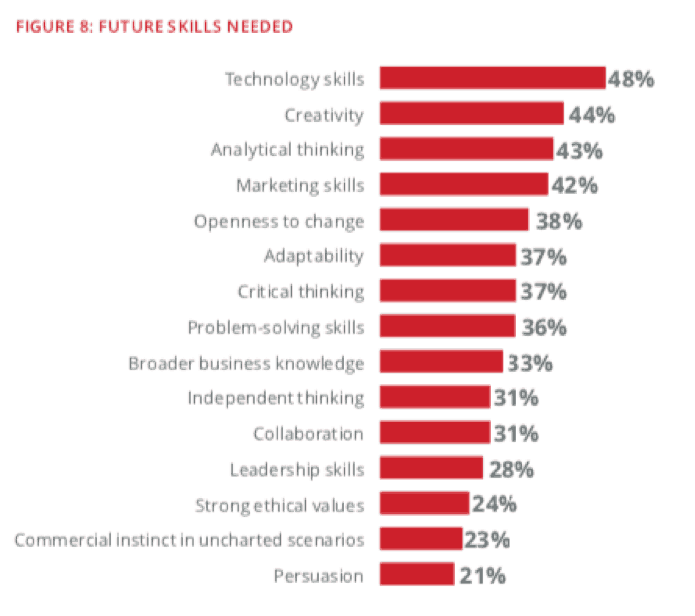
Marketers of the future: agile, digitally-savvy, customer-centric change-drivers.
It’s a mouthful, sure.
But, according to a recent survey, it might also be the best description of marketing hires in the next five years.
The Economist Group and Digital Marketing Institute (DMI) recently released a report examining the future of and intersection between talent and technology in marketing, based on interviews with over 500 marketing executives.
In the report, both organizations acknowledged that one truth remains constant: There will always be a new technology to rule them all.
In response to this truth, marketers need to begin asking themselves some important questions:
- Marketing executives: Do I have the team, resources, and agility to keep pace with this constant innovation?
- For all other marketers: Do I have the skills to remain valuable in this brave new world?
In this article, we’ll discuss why marketers need to “level up” their skills and what skills they should look to develop in the future to accelerate their careers.
Talent & Technology: Challenges On The Path To Success
In a previous article, we dove into the three drivers of success marketing leaders were planning to focus on in the next 5 years: customer experience, data analytics, and strategy/brand management.
Outside of reporting on which factors drive marketing’s success, leaders were also asked to describe their team’s current challenges.
One stood out above the rest: Talent.
70% of marketing leaders reported that a lack of in-house talent was a key challenge to their current goals.

On top of this, executives said that a lack of innovation introduced its own difficulties, with 55% of respondents agreeing with the statement: “My company has not kept pace with the new technologies that everyday consumers are using today.”
It seems the balance between getting the right technologies and the right talent in place has become a major sticking point within marketing organizations. This becomes even more apparent when talking about recruiting, as shown in the graph below.

The three most difficult marketing disciplines to hire for are identical to the drivers marketing leaders use to measure their success.
For each success driver, executives responded as follows:
- Customer experience: 87% said that their companies need to invest in customer experience technologies.
- Strategy: 83% said their teams must evolve to keep pace with advancements in technologies.
- Data and analytics: 84% indicated that data and analytics skills were vital to the marketing function in delivering on personalization.
These three recruiting difficulties align with the skills marketing leaders have said they are looking for in new hires. So, what skills will drive the future of marketing and bridge the 70% skills deficit?
The 15 Skills Employers Are Looking For In Their Next Marketing Hire
When asked to report on what skills were needed in a future marketing workforce, executives offered a mixed bag:
- Technology skills
- Creativity
- Analytical thinking
- Marketing skills
- Openness to change
- Adaptability
- Critical thinking
- Problem-solving skills
- Broader business knowledge
- Independent thinking
- Collaboration
- Leadership skills
- Strong ethical values
- Commercial instinct in uncharted scenarios
- Persuasion
While the list shows obvious responses like “marketing skills,” others listed came as a surprise for the report analysts:
“…the rest of the top ten responses notably identify skills not typically associated with traditional marketing. These include technology skills (48%), openness to change (38%), adaptability (37%) and broader business knowledge (33%). This could reflect a need to fundamentally rethink what is required of a successful marketer in the coming environment.”

In response to this mixed bag breakdown, many leaders may think they need to split their teams between soft skills and hard skills. However, the report openly argues against this approach:
“AI, data and analytics platforms, and other technologies can help automate a lot of our work, but creativity and strategic insight remain innately human tasks (at least for now).”
It’s clear then that the most successful marketing organizations will use hard skills to carry out customer innovations, and soft skills to improve both the customer experience and company culture in the long-term.
Let’s briefly look at each of these 15 areas of expertise and understand what’s being asked of marketers.
Technology Skills
Digital transformation requires that marketers become increasingly more comfortable with technologies to help automate and scale their efforts. In other words, being technically competent is no longer reserved for marketing operations.
Those in fields from demand generation to content marketing are now using MarTech in their everyday work.
Areas marketers can look to focus on include:
- Marketing automation
- Reporting and analysis
- A/B testing and optimization
- Content management systems
Creativity
Despite the critical role that technology and hard skills have taken in transforming marketing, one skill every marketing hire is still measured on is creative thinking. Marketing is a department that drives innovation. Creativity is what allows marketers to spearhead and bring new and interesting ideas to the marketplace.
Former VP of Marketing at Drift, Dave Gerhardt, constantly points to skills like copywriting as the absolute best area every marketer should focus on improving.
“Copywriting is hands down the most important skill in marketing today. It’s probably always been the most important skill in marketing, but it’s the one thing that we have kind of lost because marketing is all about technology and tools and tunnels and spreadsheets and all that stuff which is great, but through that, we’ve really lost the art of copywriting.”
– 10 Things That Made Me a Better Marketer, Dave Gerhardt
Outside of copywriting, creativity can also dip into some of the other skills mentioned in the report, including problem-solving and critical thinking.
Analytical Thinking
Some of the most successful marketers are using data to drive their decision-making process.
Demand generation and marketing operations are just two disciplines that require people who can think analytically and make decisions driven by data and research. However, even content marketers and PR managers can benefit greatly from taking a more analytical approach to their work.
For example, a great content marketer is no longer just measured by their writing ability. After all, great writing means nothing if no one is going to read what you write. Great content writers don’t write in a vacuum. They do their SEO and persona research and position their content around topics for the right audience and value proposition.
Marketing Skills
With growing specializations taking over the marketing field, it’s easy to forget the fundamentals. This is especially true for more technical professions like SEO analysts where numbers tell a story, but not the whole story.
Having a strong foundation in marketing basics and a good understanding of the customer is vital for keeping a team grounded in a common mission.
“In recent years, we’ve had so much splintering of marketing skillsets with people who are very good at specific technical things, such as SEO or programmatic – but this has created a real lack of marketing fundamentals. We need to recruit people who understand the foundation of good marketing because that can be applied to any channel and any technology.”
– Julie Roehm, Former Chief Customer Experience & Marketing Officer at Abra
Openness To Change
As a hypergrowth company, Drift’s marketing team has undergone a lot of change over the last three to four years. Part of this transition means we’ve needed to learn to, in the words of former Facebook executive Molly Graham, “let go of our legos” and egos when it comes to our jobs.
If hypergrowth has taught us anything it’s that we need people willing to get out of their comfort zones and take on new responsibilities – quickly. Part of this means marketers need to be willing to delegate and pass responsibilities on to others, and “carry the torch” when need be. This sense of openness to change is something we look for in all new hires and try to develop among our team.
Adaptability
Being open to change is one thing, having the adaptability to keep up seamlessly with that ongoing change is another. In other words, if “openness to change” is the attitude, “adaptability” is the act of making that change successful.
Critical Thinking
If you’re not willing to put the critical thinking required into your marketing plan, you’ll have a hard time convincing leadership or other departments that it’s worth executing.
The authors of the Perpetual Evolution Report said that critical thinking goes beyond just a simple skill. Critical thinking is an approach to how people work, and because of this, it has a larger role to play in a company’s culture. It’s on leadership to train and set expectations for their team to approach projects with a critical eye.
Problem-Solving Skills
In any position, you want to be the person people can count on to get the job done. The best problem-solvers are those who:
- Keep a cool head under pressure
- Use their creativity to solve issues
- Know who to collaborate with
- And communicate fixes clearly
Problem-solving is a skill best developed “on the job.” Meaning, leadership should be training employees on how to use their expertise to solve issues and provide feedback post-mortem on how they can continue to improve.
Broader Business Knowledge
More than ever before, job posters are including “industry knowledge” or “business knowledge” in position requirements. Marketers aren’t just specializing in their field, but are being asked to become subject-matter experts in their industries. As such, marketers should keep in tune with industry trends and use that to guide their work.
Independent Thinking
One of the biggest mistakes in leadership is hiring people and then constantly telling them how to perform their jobs. While on-the-job training and feedback are important, leadership should be hiring smart people to do the jobs they can’t. This means that marketers must be willing to work independently, but also provide guidance to others on the reasons behind the decisions they make – which brings us to our next coveted skill ?
Collaboration
Marketing is not done in isolation. In fact, one of the core principles of Drift’s marketing playbook is that marketing is everyone’s job. How do we do this? We promote complete transparency on the work we’re doing and encourage others to participate.
This is often the case around things like content launches. When we launch a big marketing piece at Drift, we’re constantly posting to the whole company and asking them to spread the word online to their networks.
Leadership Skills
Less specific to marketing, leadership skills are an important in-house training requirement as employees evolve and grow in their careers. When looking to take the next step in your career, many companies will want to see that you have some kind of leadership experience. Obviously, this doesn’t always mean having direct reports. Sometimes it means taking the lead on collaborative projects or managing freelancer assignments.
Leadership means you feel comfortable taking ownership of a project that doesn’t just involve you and being able to provide guidance during the process. At Drift, employees use our leadership principles in every facet of their work, including the promotion process.
Strong Ethical Values
We’ve seen a lot of headlines in the last few years about the misuse of customers’ personal information for marketing gain. Situations like these give marketers a bad rep when it comes to ethics. But misuse of data isn’t the only way to stray ethically. Using misleading or “over-promising” copy is a prevalent issue.
A recent report from Salesforce on the state of customer engagement emphasized the important role trust plays in customer loyalty. According to the report, “73% of customers state that trust matters more than ever before – but find that companies are severely lacking in bridging that trust.”
Commercial Instinct In Uncharted Scenarios
Even the most seasoned experts can have the wrong instinct when it comes to making a decision. The important thing is that they learn from that misstep. The best way to develop natural instincts about what will and will not be successful requires learning from other marketers.
That’s why it’s important to be a constant sponge:
- Read marketing books
- Listen to marketing podcasts
- Keep on top of trends in your industry by subscribing to relevant newsletters and topics on Google Alerts
At Drift, we have a number of leadership principles. One of those is “being a curious learning machine.” This led us to create a number of employee programs like Show and Tell, Book Club, Mentor Series and more.
Persuasion
Whether it’s convincing your audience or persuading your internal team to take on a new project, persuasion is an invaluable marketing discipline. Not only is mastering persuasion important for getting people on board with an idea, but it’s also useful for fleshing out your own ideas.
Train Or Hire: Finding The Right Balance On A Marketing Team
One of the harder questions for marketing leadership to answer is whether they should be training for skills in-house or looking to onboard these skills with new hires. 87% of executives from the Perpetual Evolution report said that investing in talent is key.
However, executives were split on whether that means focusing on recruitment or reskilling current talent:
“While the research indicates that marketers will place a strong emphasis on recruitment (47% say they will focus “somewhat or much more” on recruitment), a sizeable number (40%) say they will focus equally on recruitment and reskilling of their existing workforce.”
Marketing leaders should look to assess the current state of their marketing organization before onboarding new talent. This is best done by using a talent audit to determine the current skills and behaviors that make up the marketing team.
If you’re a marketing leader, begin a talent audit of the current organization by:
- Building an organizational chart of your current marketing team
- Noting the skills and teammates that will help deliver on goals over the next 12 months
- Identifying the gaps in the hierarchy
- Developing a hiring roadmap to onboard those roles in your organization
For marketers, informing your managers on the skills you’d like to develop and having them help you develop those skills is the best way to remain valuable in your position. Specifically:
- Talk about which skills you’d like to develop
- See how those skills align with your company’s current goals
- Investigate resources to help build on those skills moving forward
Conversational Marketing: The Newest Tool of Modern Marketers
We hope the steps in this article help you either optimize your modern marketing organization or prepare you for a future in marketing. Whatever the case, be sure to keep in touch with the trends shaping the marketing field.
One such trend? Conversational marketing.







